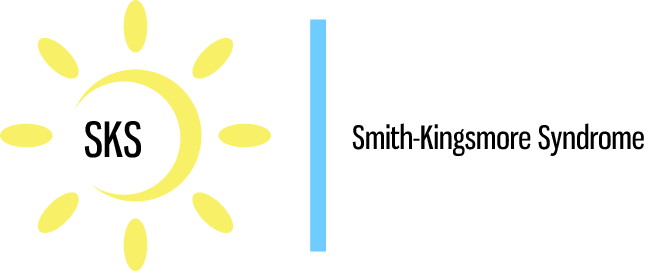SKSF Awards Research Grant
In support of our mission, Smith-Kingsmore Syndrome Foundation provides funding through grants that will advance research. We awarded our first grant of $58,852.50 in August 2020. This grant is funding a full-time postdoctoral researcher at the University of Florida for one year, supporting the research of Dr. Andrew Liu and his team. They have been working tirelessly to help our kids. This work in particular is accelerating the knowledge of Smith-Kingsmore syndrome. So it is critical that we support it now to make sure it can continue.
Thank YOU !!
This grant is thanks to your individual contributions, monthly recurring contributions, corporate donations, birthday fundraisers, WOD support, and t-shirt purchases.
Let’s build now on our already phenomenal momentum. Please donate and help us support researchers like Dr. Liu and his team. Help us fund SKS research to make a real difference in the lives of all of our children. There is no time to waste!
Research We Are Funding
Updates from Dr. Liu’s Lab
TEAM: Andrew C. Liu (PI), Yang Shen (postdoc fellow), Destino Roman (research assistant)
Funding Research – August 2021
- Dr. Andrew Liu provides the latest details on Smith-Kingsmore syndrome research at the University of Florida in this video update.
Funding Research – February 2021
SKS Research Today:
- Liu’s research lab, at the University of Florida, has been very busy! 60 genetic variations have been created. Currently, his research team is looking at 6 of these variants and comparing their reactions to four different basal conditions.
- Recently, there has been a huge breakthrough with the creation of stable cell lines that express the individual SKS mutants and so far has shown increased throughput and consistency in control test results. This will yield reliable data which is more likely to be published. Additionally, the turn-around time when studying all of the variations of SKS will improve because they can create and save everything more quickly.
- With this stable cell line, they are looking at different mutation activities under different conditions including the effect of circadian rhythms, sensitivity to Rapamycin, and change of cell size.
- Liu’s team is not only doing SKS research, but they are continuously evaluating other research and how that could apply and improve the SKS research.
- They have been working with two SKS mice in collaboration with Cincinnati Children’s Hospital Medical Center (CCHMC). Another postdoc and grad researcher in Dr. Liu’s lab, who are not SKS dedicated, are studying ways to manipulate gene function in specific regions of the brain of mice. If they are successful, the team will apply these potential learnings to their SKS research.
- Liu’s SKS team expects this stage of preliminary research which began in October 2020 (thanks to our community’s support) to last about 2 years.
SKS Research Tomorrow:
- This Spring, Dr. Liu plans to write a paper on his research on the data from the 6 mutation along with aggregated clinical data from Dr. Prada, from CCHMC.
- Then towards the end of 2021, Dr. Liu projects a second paper comparing how 2-3 dozen of the SKS variations are distinguished from one another.
- By the end of 2021, Dr. Liu projects his team will have closely examined 1/3 to 1/2 of the genetic variations, comparing against one another, like the initial work with the first 6 they are focused on currently.
- They remain focused on the SKS biochemistry, cells and mice, with the ultimate goal of human translational research.
Funding Research – November 2020
Summary of Recent Progresses:
- Spring and summer 2020: generated 46 mutations which include known SKS mutations and new ones identified by our SKS diagnosis team. Will include new alleles.
- Summer 2020: tested over 12 alleles under conditions deprived of glucose, amino acids and serum, namely total starvation. There was concern about cell health.
- August-October 2020: established the conditions to more accurately determine the SKS alleles under glucose, amino acid, or serum starvation, as well as rapamycin inhibition.
- August-October 2020: focused on 6 SKS alleles for their activity under glucose or amino acid starvation. Each variant responds differently to different condition.
- Fall 2020: In collaboration with Dr. Hogenesch at CCHMC, we obtained two mouse models (R1480-C1483 deletion and V2406M). We are breeding the founders. If breeding is successful, we will expand the mice for behavioral, neurological and molecular studies. The cell and mouse model studies will form synergy.
Detailed Progress Report:
The attached progress report, prepared by Dr. Liu’s team, provides more details on the research underway.
Funding Research – August 2020
Dr. Liu describes the research his team conducts and what they specifically hope to accomplish with Smith-Kingsmore syndrome in this short video:
Here is an overview of the plan for Smith-Kingsmore syndrome research:
- Dr. Liu and his team have developed a genetic variation (allele) of each known SKS MTOR variant to understand the individual challenges for a person with SKS.
- They will first test 5-10 mutations side by side with normal activity, then expand to all known SKS mutations to learn the nuances between each to fine tune treatment.
- The research can also find negative outcomes that we have yet to encounter in our children.
- This work will be cataloged in a “dictionary” and available to other doctors and researchers around the world in order to provide precision and personalized treatment options.
- Precision is important – as the master energy sensor, mTOR regulates metabolic balance (homeostasis) in each cell, and too much or too little activity can have adverse effects in cells and the whole-body physiology.
- Targeted precision medicine may one day apply early treatment during the neonatal period to prevent neurological and development issues.
- Precision and personalized treatment options can bring our children’s cellular activity into balance, improving their lives now and possibly preventing future devastating diseases, such as cancer.
